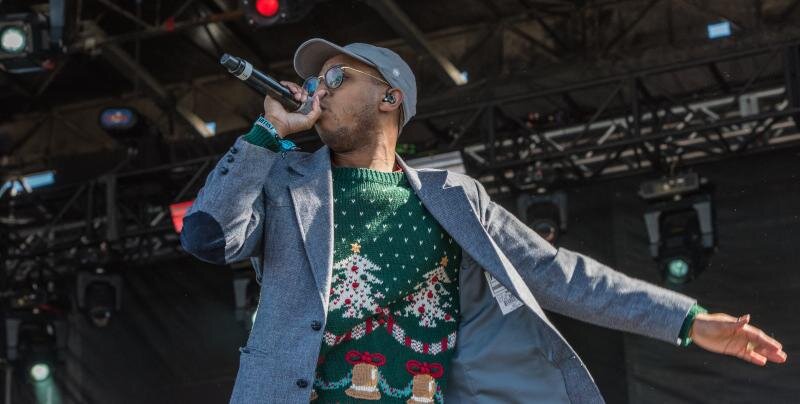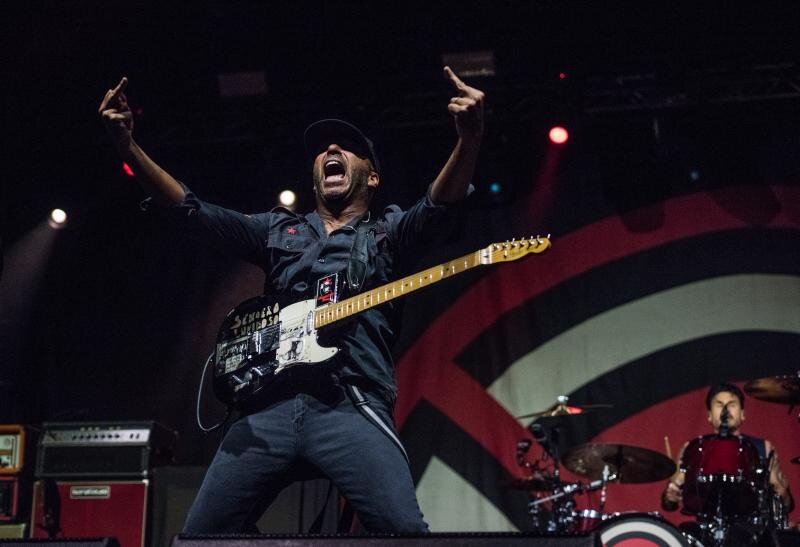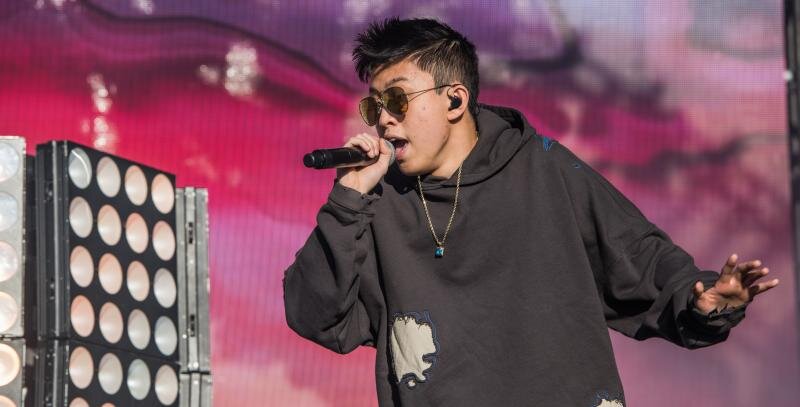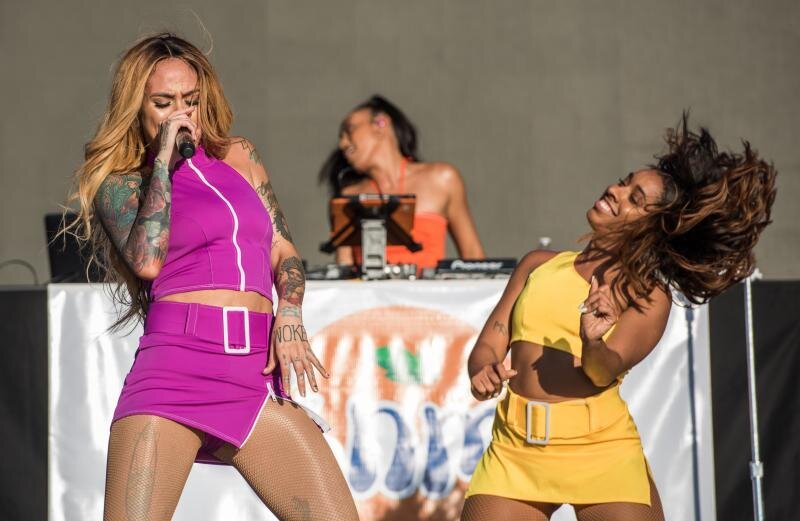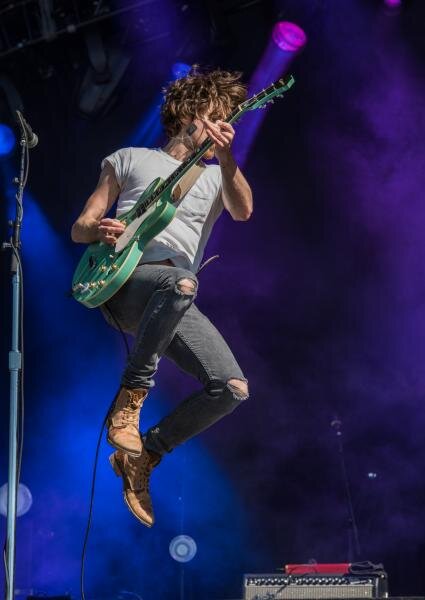Voodoo News: Post Malone is So 2017

Our last look at Voodoo 2017 includes Ron Gallo, Prophets of Rage, Bibi Bourelly, Miguel, Chicano Batman, Bleached, Benjamin Booker and more.
Critics love subtlety and nuance—two things Post Malone avoids like cooties. “This is my favorite part of the show because I can smoke since there aren’t too many words,” he announced Sunday at Voodoo when he introduced “Up There.” Before he played “Feeling Whitney,” he explained that the song was his second favorite part of the show because “I get to sit my fat ass down.” When he wanted to examine heartbreak at Voodoo Sunday, he announced, “This song is dedicated to the stupid bitch who broke my heart.” He didn’t tell the massive crowd at the Wisner Stage how he felt about being handed and playing an out-of-tune guitar to play while sitting on the chair brought out for the occasion, nor did we learn his third or fourth-favorite songs. Still, for the hour Post Malone was on stage, he did pretty much whatever he pleased.
That trait clearly made him relatable for the crowd, and he didn’t play a song without at least pockets of the audience gesturing with him, hands in the air as if they were onstage with him. “I don’t want to die too young,” he sang, and neither did they. When Malone introduced “I Fall Apart” by saying, “This song is dedicated to the stupid bitch who broke my heart,” they answered, “Fuck that bitch” without thinking about how that reflexive, dismissive anger toward women connects the social climate that produced #MeToo. (And how about a show of hands of those who think Malone would be an easy boyfriend to deal with?)
When he quick-sketched his journey from a young teen making mixtapes to topping Billboard’s Hot 100 Chart with “Rockstar,” he told an underdog story—Post Malone versus the Haters. People who called him a “culture vulture” after “White Iverson” put him on the map simply fell into the latter category in his mind as if the cultural appropriation questions that accompany a white rapper reflect nothing but jealousy. For all the young white people who clearly found identity in hip-hop too, his dismissal was their dismissal.
In that respect, Malone is a “Rockstar” and not simply someone who sings about feeling like one on hit records, and he’s not new. The ‘60s and ‘70s produced countless stars every bit as blithely indulgent, and you know Malone has dog-eared pages with aspirational stories in the Mötley Crüe bio, The Dirt. His persona owes a lot to Kid Rock including his celebration of both his working class roots and refusal to be confined by them. Onstage, Malone wore a black Crowbar T-shirt, itself a shout-out to the New Orleans heavy metal band, but his rock stardom goes deeper than that. Malone doesn’t even acknowledge limits or boundaries as he crosses them. When he opened the show by remembering those who have recently died, he included Tom Petty, A$AP Yams and the victims of the Las Vegas shooting—people who all led very different lives in very different worlds. His willingness (or is it his ability?) to see himself in all of those spaces is genuinely something, and it’s not a reach.
And his audience responded to him personally more than the specifics of his performance. When he got intense, his voice went to a growl that didn’t give him anything, and he periodically exaggerated his “ooohs” in ways that signified nothing. He made no effort to hide the fact that his voice was still on the tracks that backed him, and as the show went on, he took more opportunities to serve as his own hype man, shouting punctuating “yeahs” or doubling some of his recorded vocal lines for emphasis. During “Rockstar,” he didn’t try to sing the hook and instead let people party to the track as they know it—largely the YouTube version, ironically. The YouTube version lacks the verses and 21 Savage’s feature as it instead loops the hook. Live, he performed one verse while grooving to his own chorus, but he wrapped the song early before it would have got to 21’s part.
Malone told the story of his struggle to introduce the set-ending “Congratulations,” during which he congratulated himself. The clear message of the song is that the joy of winning comes from rubbing it in someone’s face, and that sentiment resonated with the crowd, who sang along to the set’s valedictory moment. It wasn’t an uplifting sentiment, but it felt right in the zeitgeist, and that’s a rock star thing too. Malone reflected right now far more than Dave Grohl the night before or The Killers’ Brandon Flowers did moments later. Friday night, Kendrick Lamar presented a vision of what we’d like a rock star to be in 2017, but Malone is more genuinely living the role. (Alex Rawls)
Post Malone pleased the hoards of teenagers and frat boys who came to see him, but to a non-fan he was underwhelming. He talked a lot, then hyped himself up before playing the few songs everyone knew. Also, I couldn't even hear him over the people around me singing "Congratulations." (Lexie Kirkwood)
Blasé and anger doesn’t mix into a palatable cocktail. Bibi Bourelly’s prides herself on her unfiltered, raw persona. But at Voodoo on Friday, Bourelly’s “I won’t ever give a fuck” mantra came off as immature.
The German-Haitian singer-songwriter has had huge success writing “Higher” and “Bitch Better Have My Money” for Rihanna, as well as “Camouflage” for Selena Gomez. Her solo albums, Free the Real Pt. 1 and Free the Real Pt. 2, came out in 2016, and them and on stage, Bourelly is still searching for her own voice. Throughout the show, she made sure to tell the audience how little she cares. Whether it be about her image or her “haters,” the constant reminder of her disinterest in others’ opinions implied that Bourelly’s image is of the upmost importance. Saying that you’re real doesn’t make you real. Singing, “I’ll never give a fuck” doesn’t mean you don’t give one. (Lisa Chupp)
Miguel’s Voodoo set Sunday evening turned me into a believer. His voice, pitch perfect all night long, floated over a formidable soundscape courtesy of his badass backing band. Strong drums and bass backed a killer guitarist who sounded like Carlos Santana might if he’d linked up with Iggy Pop instead of Chad Kroeger years ago. The trio would have sounded almost like a punk band, if Miguel’s voice wasn’t so distinctly R&B.
Miguel traded in his signature faded pompadour and his sleek suit and tie for Travis Scott-style braids and a tie-dyed T-shirt on Sunday. That made him look and sound free, unshackled by the chains of pop stardom. He focused on material from the critically acclaimed and genre-defying Wildheart (2015), but even his standard, somewhat gimmicky hits such as “Coffee” got unconventional arrangements, and they sounded great.
Miguel moved at maybe 10 different speeds throughout the night, from MPC-backed slow jams to noisy, guitar-driven euphoria, showcasing his insane versatility. His longest pause came after “How Many Drinks?” when he told the crowd he was going to talk about something serious for a minute. The audience tangibly tensed up as we braced ourselves for a political monologue, but instead, Miguel asked us the simple yet polarizing question, “Do you like drugs?” He then started his pun-driven classic, “Do You…” with a Bob Marley “Stir It Up” interlude thrown in for good measure. With the political climate hanging over our heads every waking moment, it was a refreshing release to hear the title refrain reworked with “Do you like hugs?” and even “Do you like love?” over the course of the stretched out, six-minute power ballad.
The band did another quick fake out, half-exiting the stage after “Coffee,” but it was too early in the night for full encore antics, so they came back quickly. “You know we gotta skywalk before we go,” Miguel said succinctly, before launching into his latest hit single, “Sky Walker,” featuring Travis Scott. The crowd went crazy, singing and dancing along as Miguel closed out one of the best sets at Voodoo. (Raphael Helfand)
Friday night, three-quarters of Rage Against the Machine teamed with Public Enemy’s Chuck D and DJ Lord and Cypress Hill’s B-Real to speak to the moment as Prophets of Rage. Maybe we needed to hear “Take the Power Back” when Rage recorded the song in 1992, and maybe what we needed then was a good headful of righteous rage to spark people to action. Right now though, the Rage cover came off as sloganeering, and you can read Facebook for five minutes and see that the left doesn’t suffer from a lack of rage. Go to YouTube and you can find video after video of angry White Nationalists on the other side. The Prophets of Rage effectively summoned the sort of high-powered sonic fury that Rage specialized in, but we need a smarter, more specific takedown of Trumpism or a critique of rage itself. Friday night, I loved hearing Chuck D’s voice and Tom Morello’s guitar, but the band felt like a nostalgia act, one that took us back to the days when the biggest issue facing young people was the drive to get the Motor Voter Bill passed into law. (Alex Rawls)
Ron Gallo is the type of badass that girls fall in love with and high school jocks don’t understand why. Gallo squealed spookily in olive overalls and John Lennon shades on at Voodoo on Sunday. (Lisa Chupp)
Saturday night, Foo Fighters revisited classic rock with an emphasis on all the gestures of power. Sunday, Ron Gallo’s songs from Heavy Meta took a run at the same body of work, but even when he covered The Beatles’ “Helter Skelter” and lifted songs from The Rolling Stones, Gallo undermined any built-in cultural power by attacking the songs with punk irreverence. The rock ’n’ roll fun in his songs was immediately obvious to anyone who has ever played an electric guitar because Gallo played meaty riffs at length because—duh—they’re so much fun to play. (Alex Rawls)
Often times, garage rock basks in the glory of the “old days” without moving the music forward or tapping into contemporary issues. Foo Fighters did just that during their set Saturday night at Voodoo, reverting to themes of power at a time when conventional masculinity is being called into question. Where Foo Fighters used musical themes of the ‘70s to communicate outdated clichés, Gallo tapped into the philosophical aspect of the same decade.
Gallo’s lyrics make it clear that he is a deep thinker. On “Poor Traits of the Artist,” Gallo sang, “It’s easy to blame work, love and weather / It’s easy to act like you’ve got it together / But behind my door, and on my floor / Is a man who can’t stand what he stands for.” Gallo delivered the internal rhymes with the slight rock of his hips while his bassist jammed out and the drummer grinned enthusiastically, shaking his shaggy hair like a wet dog. Gallo sees the inherent irony of existence but his attitude remains indifferent. Gallo did not attempting to push beliefs on the audience nor did he act elitist. He exuded genuine down-to-earth intelligence in lyricism and stage presence.
An hour and a half after his show on the main stage, Gallo performed at the Toyota Music Den. Gallo was at home in this intimate setting. At The Altar Stage, Gallo told everyone who he was. With a smaller audience, he was simply himself. Gallo mocked the commercial, consumer culture in the Toyota tent and its free advertisements and give-aways by taking out a piece of paper and thanking a list of Toyota cars, including the Toyota Prius.
While singing “Kill The Medicine Man,” Gallo put down his guitar and caressed the model car that sat obtrusively with the audience. He opened the door of the car while singing and sat in the drivers seat. His face was blank, but he was clearly having fun with the bit. Singing this particular song while poking fun at consumerism was apropos. Gallo criticized America’s love affair with prescription medication, singing, “You take your medicine/you say you feel like a man/because you can’t deal/forget the world/You’re just running from the hurt.” Gallo sees over-consumption of any kind as an insincere approach to reality. Whether he realized it or not, this was the perfect moment for him to hop in that car. (Lisa Chupp)
Yellow Claw was incredible for the bass-head crowd. Bass was ridiculous and shaking everyone. And it was a very nice, heavy, follow-up to NGHTMRE, who is also very trappy. Nightmare was an amazing warm up, but still a warm up for Yellow Claw. Everyone was head banging and ready. (Lexie Kirkwood)
Friday afternoon in the Toyota Music Den, Los Angeles’ Bleached played sloppy, sweaty beach punk, executed to perfection. Their no-frills approach sounds raw in the studio, but live, they perform their songs as a tight unit. Jennifer and Jessica Clavin, the band’s core members, took center stage, harmonizing vocally and on guitar. Musically, they operated in concert, though they differentiated themselves through their personas. Jennifer was the de facto front woman, interacting with her intimate audience and even hopping on the drums during the finale, “Dead In Your Head.” Jessica was slightly more reserved, though by no means standoffish. The drummer and bassist, wearing Green Goblin and Jason masks respectively, took on supporting roles. In a male-dominated Voodoo lineup, it was refreshing to see a female-centric band, with male members who didn’t seem eager to steal the show. (Raphael Helfand)
Illenium is one of only a few DJs that actually is better recorded than live. The show had good vibes and a feel-good set, but perhaps because of the high quality rest of the DJ shows it just didn't stand out. (Lexie Kirkwood)
Best outfits of the weekend: Kehlani, her dancers and her DJ all dressed in Fanta colors, and local rapper Alfred Banks, rocking a Keith Haring rain slicker and Keith Haring high-tops. (Alex Rawls)
Worst thing I heard all weekend: Gnash. Can hip-hop could sound more suburban? (Alex Rawls)
Luckiest Guy at Voodoo: Aminé, who benefited from Post Malone’s “Rockstar” going to number one. The Portland rapper would have enjoyed a solid audience anyway, but the song’s success meant that people caught his set to stake out a spot at the Winner Stage for Malone, who’d follow shortly. Fortunately, he had enough of his own fans and enough game to win over the crowd. His vibe was very different, and instead of celebrating indulgence and id, Aminé repeatedly told the audience, “You’re beautiful,” and they answered as instructed, “I know.” Aminé also had songs, finishing with “Spice Girl” (about the kind of girl he wants, complete an excerpt of “Wannabe”), and “Caroline,” which included the lines, “Don't wanna talk it out, can we fuck it out? / 'Cause we gon' be up all night, fuck a decaf / You say I'm a tall thug, guess I'm a G-raffe.” After that, he ended the set and returned for one of the few encores of the weekend—“Spice Girl” one more time. (Alex Rawls)
In the past, I’ve liked but not loved Chicano Batman, whose name and gimmick—performing in ‘60s wedding reception jackets with frilly shirts—could always get me to hang out for 15 or so fun minutes. Since I last saw the band, the suits do less of the work as Chicano Batman has grown into its psychedelic Latin Soul vibe with better songs and more fully realized arrangements. It helped that singer Bardo Martinez has become a genuine and compelling front person when he is away from his Farfisa organ. The overall upgrade was obvious when bassist Eduardo Arenas passed his bass to Martinez while he picked up a guitar for a Latin dub groove that was masterful. (Alex Rawls)
It was great to see Benjamin Booker grow up because that’s what emotionally healthy people do, and his blues remained intense in concert Friday, perhaps because his voice can’t be anything but. Still, I missed his possessed stage persona, as if his music was tossing him around the stage. Booker’s more restrained stage presence made him a less breathless, more reliable performer, and it’s not a reach to imagine the City Winerys of the world helping him achieve a more tasteful, lucrative future than he’d ever find lurching around the stage in the throes of a gnarly minor-key scale. (Alex Rawls)
To see the photos in a viewer, click on the images. For more reviews of this weekend at Voodoo, check our coverage of LCD Soundsystem and Kendrick Lamar Friday night, Foo Fighters Saturday night, and The Killers on Sunday night. You can also look back at our previews of Pell, Galantis, Kehlani, Brand New, Benjamin Booker and Post Malone.



